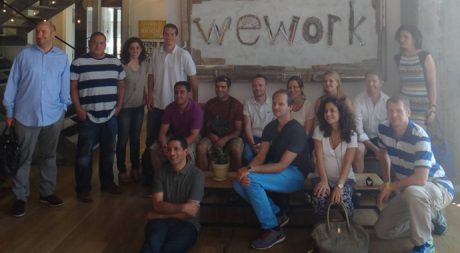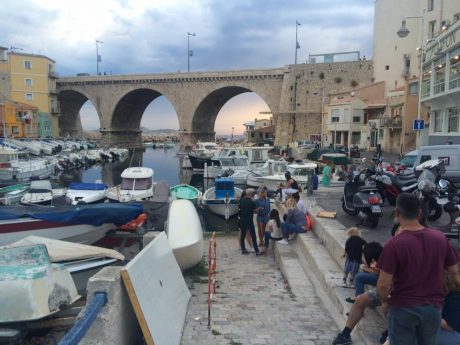How to kickstart your business and/or EMBA thesis idea and besides having an awesome trip to one truly unique region of the world?
In June 2016 I was a member of the first Frankfurt School EMBA group to visit IDC Herzliya in Tel Aviv (Israel) as part of the program’s international module. Until then I had a mixed image of Israel in my head which consisted partly of a successful technology hub and partly of less positive news related to the specific regional circumstances. What followed was a mind blowing week full of expert insights on starting a business and tons of awesome impressions of an exciting cosmopolitan city and a very beautiful and enjoyable country.
To be perfectly prepared for the international module we received the book “Start-up Nation. The Story of Israel’s Economic Miracle” in advance of the trip. The authors point out that two important reasons for the extraordinary innovativeness of Israel are the organizational structure and the behavioral culture of the IDF (Israel Defense Forces) which every young Israeli adult is a member of for a certain amount of time. This means critical, independent thinking, i.e. the famous “chutzpah” and a strong focus on defense are essential characteristics of an Israeli entrepreneur and of the Israeli way of life. With this in mind I experienced a small surprise as I arrived at our location in Herzliya, Tel Aviv (where four persons of our group had rented a house via Airbnb while the rest of us was staying in a hotel downtown Tel Aviv): The key to our very nice house was not delivered by the host or by a trustworthy neighbor. It was just “hidden” in a small cabinet right outside the main door, more or less openly for anybody to find who would have cared about taking a peek inside it. So much about a focus on defense respectively protection… On the other hand it was the first glimpse of an unexpected liberal and relaxed attitude which we ran across multiple times more during the remainder of the week.

At the Interdisciplinary Center (IDC) Herzliya the mentor of our group (which consisted of ten students of Frankfurt School and five local students of IDC’s EMBA program) for the week was the phenomenal Dr. Yossi Maaravi, founder of two start-ups himself, honored academic lecturer and a mentor in the ZELL program, which is the entrepreneurship program of the IDC. Yossi used a great mix of theoretical insights from academic research and business case-studies (Airbnb, Better place) and practical tasks which were mostly solved in small groups. Beside that we received the insights of a successful entrepreneur (Gil Hakim, TheraCoat / Urogen) and visited a shared office space. But the focus was clearly on the practical development of our own startups and so we all got the chance to create, present and work on our business ideas throughout most of the week.
At the end of day 1 the task was clearly defined: think of 10 business ideas and bring them to class. As we were 15 participants this made 150 business ideas. During an “idea fair” on day 2 three of those ideas were presented per person via short elevator pitches. At the end five ideas were picked per vote and progressed in small groups as our own start-up ventures.
From then on we zigzagged between the theoretical fundamentals and the practical application of those fundamentals in our projects. The fundamentals consist of the lean startup method which is based on the general idea to shorten the development cycle of a market-ready product. This is achieved by a hypothesis driven learning process that is based on the continuous matching of the product and the expectations of the customers. The central tool of the method is the business canvas which is a management template to structure the key elements of your startup business, including the value proposition, the business model and your mvp (minimum viable product). The minimum viable product is the smallest possible test version of your product which could be produced and sold in reality. The goal of the mvp is to validate your hypotheses about your product and it’s features by getting feedback of potential customers. If your hypotheses get validated you move on with your product, if not you pivot the core of your business idea which means you change your product in a way so that it will better match the demands of your customers.
Every group presented their business idea several times in class and then adjusted it along the lines of the received feedback. At the last day of the program the final presentations were held under the attendance of Ronen Soffer from Intel Israel who critically evaluated the ideas and gave each group constructive feedback.
To complete our studies on creating a startup we visited the accelerator “AtoBe” at the Azrieli College of Engineering in Jerusalem to get exclusive insights about the support of promising entrepreneurs.
 Besides our studies every evening was thoroughly planned by a designated CEO = Chief Evening Officer. That’s why we experienced several recreational highlights as sailing on a yacht in the Mediterranean Sea, a barbecue at our airbnb location including a quiz about the members of our group and a high-class wine tasting in downtown Tel Aviv, just to name a few.
Besides our studies every evening was thoroughly planned by a designated CEO = Chief Evening Officer. That’s why we experienced several recreational highlights as sailing on a yacht in the Mediterranean Sea, a barbecue at our airbnb location including a quiz about the members of our group and a high-class wine tasting in downtown Tel Aviv, just to name a few.
Furthermore I personally recommend a visit to Jerusalem and the Dead Sea if you can spare the time. Both locations are very unique and in my opinion two of the must see places in the world!
Out of the 123 reasons available, I present only my top three.
– First-hand insights: Experts with academic and practical experience in setting up successful start-ups and driving innovations will share their exclusive knowledge with you and they will support you in detail to bring your business idea to the next level.
– Quick-wins: The elaborated mix of the module combines an easy to use theoretical framework and a hands-on approach which will help you to make quick progress right from the start and after only one week you will end up with essential accomplishments for your business idea.
– Creative environment: In Tel Aviv you will be able to combine high-class studying during the day and all the recreational benefits of a cosmopolitan city at the Mediterranean Sea in the evening: Awesome sights, beautiful beaches, perfect weather, great food, exciting nightlife – you name it, Tel Aviv got it! Go to Tel Aviv!